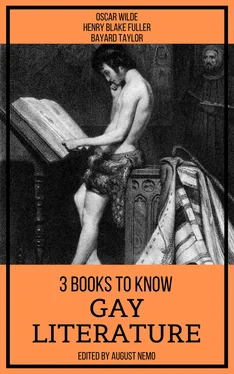He felt that the man must be got rid of at once. He must not be allowed to know where the picture was being taken to. There was something sly about him, and he had thoughtful, treacherous eyes. Sitting down at the writing-table, he scribbled a note to Lord Henry, asking him to send him round something to read, and reminding him that they were to meet at eight-fifteen that evening.
“Wait for an answer,” he said, handing it to him, “and show the men in here.”
In two or three minutes there was another knock, and Mr. Hubbard himself, the celebrated frame-maker of South Audley Street, came in with a somewhat rough-looking young assistant. Mr. Hubbard was a florid, red-whiskered little man, whose admiration for art was considerably tempered by the inveterate impecuniosity of most of the artists who dealt with him. As a rule, he never left his shop. He waited for people to come to him. But he always made an exception in favour of Dorian Gray. There was something about Dorian that charmed everybody. It was a pleasure even to see him.
“What can I do for you, Mr. Gray?” he said, rubbing his fat freckled hands. “I thought I would do myself the honour of coming round in person. I have just got a beauty of a frame, sir. Picked it up at a sale. Old Florentine. Came from Fonthill, I believe. Admirably suited for a religious subject, Mr. Gray.”
“I am so sorry you have given yourself the trouble of coming round, Mr. Hubbard. I shall certainly drop in and look at the frame — though I don’t go in much at present for religious art — but to-day I only want a picture carried to the top of the house for me. It is rather heavy, so I thought I would ask you to lend me a couple of your men.”
“No trouble at all, Mr. Gray. I am delighted to be of any service to you. Which is the work of art, sir?”
“This,” replied Dorian, moving the screen back. “Can you move it, covering and all, just as it is? I don’t want it to get scratched going upstairs.”
“There will be no difficulty, sir,” said the genial frame-maker, beginning, with the aid of his assistant, to unhook the picture from the long brass chains by which it was suspended. “And, now, where shall we carry it to, Mr. Gray?”
“I will show you the way, Mr. Hubbard, if you will kindly follow me. Or perhaps you had better go in front. I am afraid it is right at the top of the house. We will go up by the front staircase, as it is wider.”
He held the door open for them, and they passed out into the hall and began the ascent. The elaborate character of the frame had made the picture extremely bulky, and now and then, in spite of the obsequious protests of Mr. Hubbard, who had the true tradesman’s spirited dislike of seeing a gentleman doing anything useful, Dorian put his hand to it so as to help them.
“Something of a load to carry, sir,” gasped the little man, when they reached the top landing. And he wiped his shiny forehead.
“I am afraid it is rather heavy,” murmured Dorian, as he unlocked the door that opened into the room that was to keep for him the curious secret of his life and hide his soul from the eyes of men.
He had not entered the place for more than four years — not, indeed, since he had used it first as a play-room when he was a child, and then as a study when he grew somewhat older. It was a large, well-proportioned room, which had been specially built by the last Lord Kelso for the use of the little grandson whom, for his strange likeness to his mother, and also for other reasons, he had always hated and desired to keep at a distance. It appeared to Dorian to have but little changed. There was the huge Italian cassone, with its fantastically-painted panels and its tarnished gilt mouldings, in which he had so often hidden himself as a boy. There the satinwood bookcase filled with his dog-eared schoolbooks. On the wall behind it was hanging the same ragged Flemish tapestry, where a faded king and queen were playing chess in a garden, while a company of hawkers rode by, carrying hooded birds on their gauntleted wrists. How well he remembered it all! Every moment of his lonely childhood came back to him as he looked round. He recalled the stainless purity of his boyish life, and it seemed horrible to him that it was here the fatal portrait was to be hidden away. How little he had thought, in those dead days, of all that was in store for him!
But there was no other place in the house so secure from prying eyes as this. He had the key, and no one else could enter it. Beneath its purple pall, the face painted on the canvas could grow bestial, sodden, and unclean. What did it matter? No one could see it. He himself would not see it. Why should he watch the hideous corruption of his soul? He kept his youth — that was enough. And, besides, might not his nature grow finer, after all? There was no reason that the future should be so full of shame. Some love might come across his life, and purify him, and shield him from those sins that seemed to be already stirring in spirit and in flesh — those curious unpictured sins whose very mystery lent them their subtlety and their charm. Perhaps, some day, the cruel look would have passed away from the scarlet sensitive mouth, and he might show to the world Basil Hallward’s masterpiece.
No; that was impossible. Hour by hour, and week by week, the thing upon the canvas was growing old. It might escape the hideousness of sin, but the hideousness of age was in store for it. The cheeks would become hollow or flaccid. Yellow crow’s -feet would creep round the fading eyes and make them horrible. The hair would lose its brightness, the mouth would gape or droop, would be foolish or gross, as the mouths of old men are. There would be the wrinkled throat, the cold, blue-veined hands, the twisted body, that he remembered in the grandfather who had been so stern to him in his boyhood. The picture had to be concealed. There was no help for it.
“Bring it in, Mr. Hubbard, please,” he said, wearily, turning round. “I am sorry I kept you so long. I was thinking of something else.”
“Always glad to have a rest, Mr. Gray,” answered the frame-maker, who was still gasping for breath. “Where shall we put it, sir?”
“Oh, anywhere. Here: this will do. I don’t want to have it hung up. Just lean it against the wall. Thanks.”
“Might one look at the work of art, sir?”
Dorian started. “It would not interest you, Mr. Hubbard,” he said, keeping his eye on the man. He felt ready to leap upon him and fling him to the ground if he dared to lift the gorgeous hanging that concealed the secret of his life. “I shan’t trouble you any more now. I am much obliged for your kindness in coming round.”
“Not at all, not at all, Mr. Gray. Ever ready to do anything for you, sir.” And Mr. Hubbard tramped downstairs, followed by the assistant, who glanced back at Dorian with a look of shy wonder in his rough, uncomely face. He had never seen anyone so marvellous.
When the sound of their footsteps had died away, Dorian locked the door, and put the key in his pocket. He felt safe now. No one would ever look upon the horrible thing. No eye but his would ever see his shame.
On reaching the library he found that it was just after five o’clock, and that the tea had been already brought up. On a little table of dark perfumed wood thickly encrusted with nacre, a present from Lady Radley, his guardian’s wife, a pretty professional invalid, who had spent the preceding winter in Cairo, was lying a note from Lord Henry, and beside it was a book bound in yellow paper, the cover slightly torn and the edges soiled. A copy of the third edition of The St. James’s Gazette had been placed on the tea-tray. It was evident that Victor had returned. He wondered if he had met the men in the hall as they were leaving the house, and had wormed out of them what they had been doing. He would be sure to miss the picture — had no doubt missed it already, while he had been laying the tea-things. The screen had not been set back, and a blank space was visible on the wall. Perhaps some night he might find him creeping upstairs and trying to force the door of the room. It was a horrible thing to have a spy in one’s house. He had heard of rich men who had been blackmailed all their lives by some servant who had read a letter, or overheard a conversation, or picked up a card with an address, or found beneath a pillow a withered flower or a shred of crumpled lace.
Читать дальше












